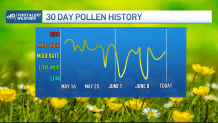As researchers anticipate pollen season to start earlier and last longer, allergens continue to be top of mind for many.
Even after a wash and rinse, pollen continues to pile up on our cars, seemingly with no end in sight.
However, light is at the end of the pollen-polluted tunnel.
In mid-May, Boston and surrounding areas were on the higher end of the pollen count. But in the past month, there has been a downward trend to moderate with fewer spikes upward, and more lows. That's been in part because of recent rain.
Get Boston local news, weather forecasts, lifestyle and entertainment stories to your inbox. Sign up for NBC Boston’s newsletters.

Though the rain hasn't put a big dent in the drought monitor, it has been enough to drop allergens and bring a break to asthmatics and sensitive groups.
The weather pattern will support this downward trend as rain moves in later this week and weekend.
Local
In-depth news coverage of the Greater Boston Area.
In the interim, it appears we'll hover in the moderate category with pine, oak and grasses among the top allergens.
On the whole, we typically anticipate tree season to come to a close in June, with grass pollen continuing into the summer.
Pollen is easily transported by wind, and this blows in a bit of hope for southern New England.
We're approaching the calmest, least windy months of the year. July and August have an average hourly wind speed of 5 mph.



